moduleAlifeinsport课文
- 格式:docx
- 大小:102.14 KB
- 文档页数:4


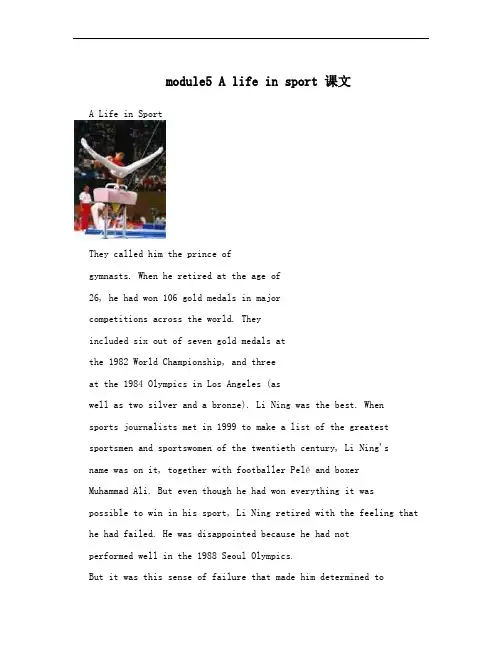
module5 A life in sport 课文A Life in SportThey called him the prince ofgymnasts. When he retired at the age of26, he had won 106 gold medals in majorcompetitions across the world. Theyincluded six out of seven gold medals atthe 1982 World Championship, and threeat the 1984 Olympics in Los Angeles (aswell as two silver and a bronze). Li Ning was the best. Whensports journalists met in 1999 to make a list of the greatest sportsmen and sportswomen of the twentieth century, Li Ning'sname was on it, together with footballer Pelé and boxerMuhammad Ali. But even though he had won everything it waspossible to win in his sport, Li Ning retired with the feeling that he had failed. He was disappointed because he had notperformed well in the 1988 Seoul Olympics.But it was this sense of failure that made him determined tosucceed in his new life. A year after his retirement, Li Ning begana new career — as a businessman. But he didn't forget hissporting background. He decided to launch a new brand ofsportswear, competing with global giants like Nike and Adidas.He made the unusual choice, for a Chinese person, of choosinghis own name as the brand mark. The bright red logo is made upof the first two pinyin letters of Li Ning's name, L and N.Li Ning's sports clothes came onto the market at just theright time. The number of young people with money to spendwas on the increase — and sport had never been so popular.Li Ning's designs were attractive, and they had a major advantage over their better-known rivals — they were cheaper.A pair of Nike trainers, for example, could cost up to five times as much as a similar Li Ning product. Success for Li Ning was guaranteed, and it came quickly.In just a few years, Li Ning won more than fifty percent of the national market. Today a Li Ning product is purchased every ten seconds. But the clothes are not only worn on the athleticstrack or the football pitch. If you go into a school or university anywhere, the chances are you will see students in Li Ning tracksuits with the familiar logo. The company has also growninternationally. The Spanish and French gymnastics teams wear LiNing clothes, while Italian designers are employed by the company tocreate new styles. Whenever Chinese athletes step out onto the track during the 2008 Olympics, they will bewearing Li Ning tracksuits.But Li Ning's goal when he retired was not to make money. His dream was to open a school for gymnasts. He was able to do this in 1991. Since then, he has continued to help young people to achieve their sporting ambitions. Like Pelé and Muhammad Ali before him, who have worked with the United Nations for children's rights and peace, Li Ning has discovered that the work of a great sportsman does not finish when he retires from the sport. It starts. And if you are a great sportsperson, anything ispossible, as Li Ning's advertising slogan says.。
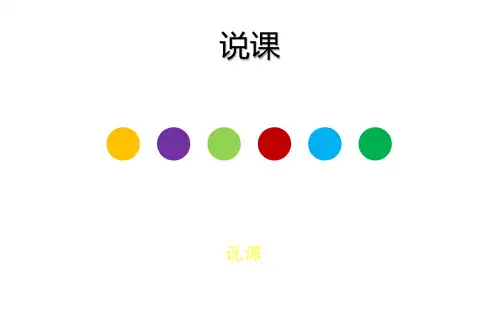

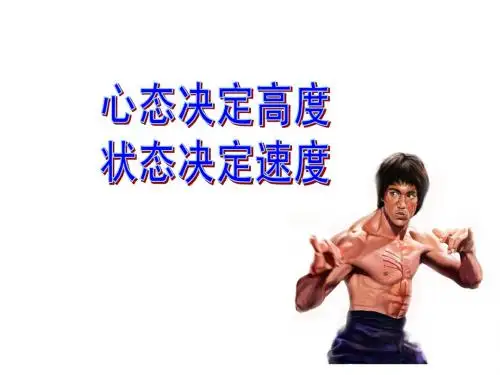
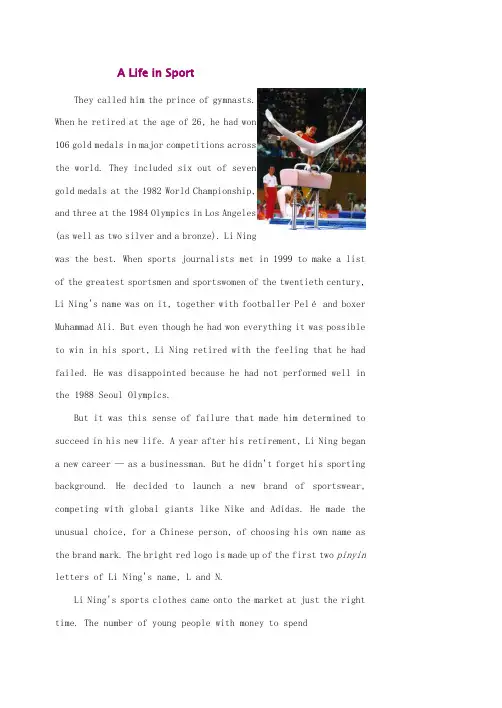
A Life in SportThey called him the prince of gymnasts.When he retired at the age of 26, he had won106 gold medals in major competitions acrossthe world. They included six out of sevengold medals at the 1982 World Championship,and three at the 1984 Olympics in Los Angeles(as well as two silver and a bronze). Li Ningwas the best. When sports journalists met in 1999 to make a list of the greatest sportsmen and sportswomen of the twentieth century, Li Ning's name was on it, together with footballer Pelé and boxer Muhammad Ali. But even though he had won everything it was possible to win in his sport, Li Ning retired with the feeling that he had failed. He was disappointed because he had not performed well in the 1988 Seoul Olympics.But it was this sense of failure that made him determined to succeed in his new life. A year after his retirement, Li Ning began a new career —as a businessman. But he didn't forget his sporting background. He decided to launch a new brand of sportswear, competing with global giants like Nike and Adidas. He made the unusual choice, for a Chinese person, of choosing his own name as the brand mark. The bright red logo is made up of the first two pinyin letters of Li Ning's name, L and N.Li Ning's sports clothes came onto the market at just the right time. The number of young people with money to spendwas on the increase — and sport had never been so popular. Li Ning's designs were attractive, and they had a major advantage over their better-known rivals — they were cheaper. A pair of Nike trainers, for example, could cost up to five times as much as a similar Li Ning product. Success for Li Ning was guaranteed, and it came quickly.In just a few years, Li Ning won more than fifty percent of the national market. Today a Li Ning product is purchased every ten seconds. But the clothes are not only worn on the athletics track or the football pitch. If you go into a school or university anywhere, the chances are you will see students in Li Ning tracksuits with the familiar logo. The company has also grown internationally. The Spanish and French gymnastics teams wear Li Ning clothes, whileItalian designersare employed by the company to create new styles. Whenever Chinese athletesstep out onto the track during the 2008 Olympics, they will be wearing Li Ning tracksuits.But Li Ning's goal when he retired was not to make money. His dream was to open a school for gymnasts. He was able to do this in 1991. Since then, he has continued to help young people to achieve their sporting ambitions. Like Pelé and Muhammad Ali before him, who have worked with the United Nations for children's rights and peace, Li Ning has discovered that the work of a great sportsman does not finish when he retires from the sport. It starts. And if you are a great sportsperson, anything is possible, as Li Ning's advertising slogan says.(素材和资料部分来自网络,供参考。

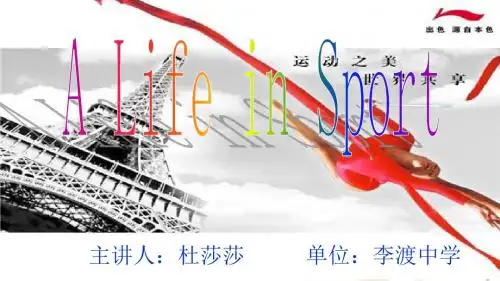
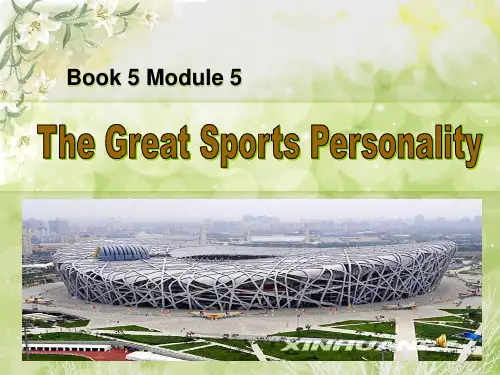
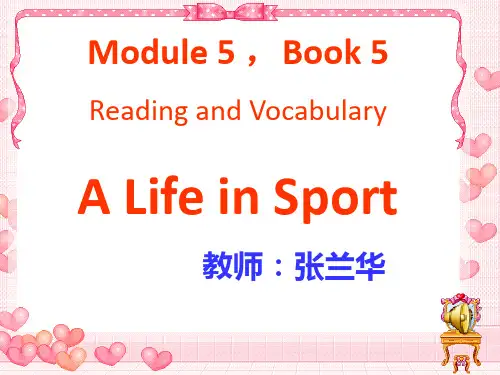
外研版新标准高中英语必修五说课稿A Life in Sport
说课稿
I.教学内容分析
本次做课的内容是外研版的“新标准”高中英语教材第五册(必修)第五模块“TheGreatSportsPersonality”中的阅读课文“ALifeinSport”。
本模块的话题是中学生比较感兴趣的体育名人,涉及到中外各种赛事和各项体育运动的多名体育明星比如体操王子李宁、拳王阿里、肯尼亚长跑名将基普凯诺、球王贝利以及马拉松运动。
通过学习,希望同学们热爱体育运动,学习体育健儿们不畏艰难、奋力拼搏的精神。
ReadingandVocabulary是一篇介绍体操王子李宁的文章。
通过了解李宁辉煌的运动生涯和退役后在商海中的奋斗以及他为中国体育事业做出的不懈努力,号召同学们热爱祖国、热爱运动,学习体育健儿们不畏艰难、永不放弃、奋力拼搏的精神。
II.教学目标及重难点
1.教学目标
(1)阅读中能识别新学词汇、短语并推断出大意。
A Life in SportThey called him the prince ofgymnasts. When he retired at the age of26, he had won 106 gold medals in majorcompetitions across the world. Theyincluded six out of seven gold medals atthe 1982 World Championship, and threeat the 1984 Olympics in Los Angeles (aswell as two silver and a bronze). Li Ning was the best. When sports journalists met in 1999 to make a list of the greatest sportsmen and sportswomen of the twentieth century, Li Ning's name was on it, together with footballer Peléand boxer Muhammad Ali. But even though he had won everything it was possible to win in his sport, Li Ning retired with the feeling that he had failed. He was disappointed because he had not performed well in the 1988 Seoul Olympics.But it was this sense of failure that made him determined to succeed in his new life. A year after his retirement, Li Ning began a new career —as a businessman. But he didn't forget his sporting background. He decided to launch a new brand of sportswear, competing with global giants like Nike and Adidas. He made the unusual choice, for a Chinese person, of choosing his own name as the brand mark. The bright red logo is made up of the first two pinyin letters of Li Ning's name, L and N.Li Ning's sports clothes came onto the market at just the right time. The number of young people with money to spendwas on the increase— and sport had never been so popular. Li Ning's designs were attractive, and they had a major advantage over their better-known rivals — they were cheaper.A pair of Nike trainers, for example, could cost up to five times as much as a similar Li Ning product. Success for Li Ning was guaranteed, and it came quickly.In just a few years, Li Ning won more than fifty percent of the national market. Today a Li Ning product is purchased every ten seconds. But the clothes are not only worn on the athletics track or the football pitch. If you go into a school or university anywhere, the chances are you will see students in Li Ning tracksuits with the familiar logo. The company has also grown internationally. The Spanish and French gymnastics teams wear Li Ning clothes, while Italian designers are employed by the company to create new styles. Whenever Chinese athletes step out onto the track during the 2008 Olympics, they will be wearing Li Ning tracksuits.But Li Ning's goal when he retired was not to make money. His dream was to open a school for gymnasts. He was able to do this in 1991. Since then, he has continued to help young people to achieve their sporting ambitions. Like Pelé and Muhammad Ali before him, who have worked with the United Nations for children's rights and peace, Li Ning has discovered that the work of a great sportsman does not finish when he retires from the sport. It starts. And if you are a great sportsperson, anything is possible, as Li Ning's advertising slogan says.。
A Life in Sport
They called him the prince of
gymnasts. When he retired at the
age of 26, he had won 106 gold
medals in major competitions
across the world. They included
six out of seven gold medals at the 1982 World Championship, and three at the 1984 Olympics in Los Angeles (as well as two silver and a bronze). Li Ning was the best. When sports journalists met in 1999 to make a list of the greatest sportsmen and sportswomen of the twentieth century, Li Ning's name was on it, together with footballer Pelé and boxer Muhammad Ali. But even though he had won everything it was possible to win in his sport, Li Ning retired with the feeling that he had failed. He was disappointed because he had not performed well in the 1988 Seoul Olympics.
But it was this sense of failure that made him determined to succeed in his new life. A year after his retiremen t, Li Ning began a new
career —as a businessm an. But he didn't forget
his sporting backgroun d. He decided
to launch a new brand of
sportswear, competing with global giants like Nike
and Adidas. He made the unusual choice, for a Chinese
person, of choosing his own name as the brand mark.
The bright red logo is made up of the first two pinyin
letters of Li Ning's name, L and N.
Li Ning's sports clothes came onto the market at
just the right time. The number of young people with
money to spend
was on
the
increase
—and
sport had
never
been so
popular.
Li Ning's
designs
were
attractiv
e, and they had a major advantage over their better-known rivals — they were cheaper. A pair of Nike trainers, for example, could cost up to five times as much as a similar Li Ning product. Success for Li Ning was guaranteed, and it came quickly.
In just a few years, Li Ning won more than fifty percent of the national market. Today a Li Ning product is purchased every ten seconds. But the clothes are not only worn on the athletics track or the football pitch. If you go into a school or university anywhere, the chances are you will see students in Li Ning tracksuits with the familiar logo. The company has also grown internationally. The Spanish and French gymnastics teams wear Li Ning clothes, while Italian designers are employed by the company to create new styles. Whenever Chinese athletes step out onto the track during the 2008 Olympics, they will be wearing Li Ning tracksuits.
But Li Ning's goal when he
retired was not to make money.
His dream was to open a school
for gymnasts. He was able to do this in 1991. Since
then, he has continued to help young people to achieve their sporting ambitions. Like Pelé and Muhammad Ali before him, who have worked with the United Nations for children's rights and peace, Li Ning has discovered that the work of a great sportsman does not finish when he retires from the sport. It starts. And if you are a great sportsperson, anything is possible, as Li Ning's advertising slogan says.。